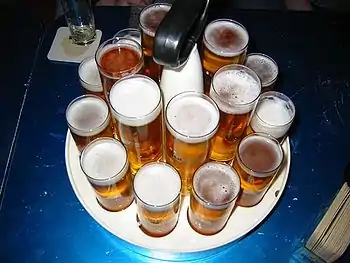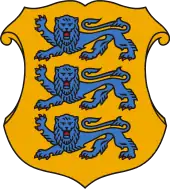Beer in Estonia
Beer (Estonian: Õlu) has been brewed in Estonia for over a thousand years. The first written reference to beer in what is now Estonia dates to 1284.[1] During the Soviet era Žiguli beer was brewed in Estonia and many other locations in the Soviet Union.[2] In Estonian, beers are often described as hele (pale) or tume (dark).[3]
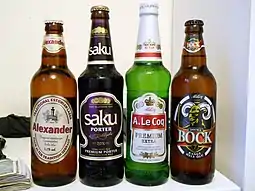
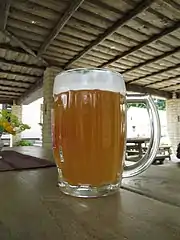
Major breweries
The Estonian beer market is dominated by Saku and A. Le Coq,[4] who in 2013 together possessed over 80 percent of market share.[5] Saku was founded in 1820 in the town of Saku near Tallinn and is owned by Carlsberg Group.[6] Tartu's A. Le Coq was founded in 1807 and is currently owned by the Finnish company Olvi.[7] Saku is traditionally stronger in north and west Estonia, while A. Le Coq has its heartland in the south and east.[5]
A. Le Coq states that it is the biggest drinks manufacturer in Estonia,[7] while Saku states that its Saku Originaal is Estonia's most popular beer brand.[6]
Both Saku and A. Le Coq operate brewery museums at their respective breweries.[8][9]
The Estonian Breweries Association (Eesti Õlletootjate Liit) represents the interests of the two large breweries.[10] The Association successfully lobbied the Estonian government into reversing rises in alcohol excise duty in 2019. This had led to a reduction in cross-border beer sales to Finland, and an increase of sales in Latvia to Estonians.[4][11]
Koduõlu
Estonia has a tradition of home-brewed beers (koduõlu) and farm beers (taluõlu) which survives mainly on the West Estonian islands. They are often flavoured with juniper and other plants such as sweet gale, also known as bog-myrtle.[12] Unlike many beers, koduõlu is not boiled during the production process and is served with only natural carbonation.[13] Pihtla farmhouse brewery on the island of Saaremaa was originally established in 1907 and describes its beers as "cloudy, yeasty and unpredictable."[14]
Craft beer
Craft beer came late to Estonia, but that began to change in 2012 when Mikkeller brewed a custom beer for the Estonian market, called Baltic Frontier. Then one local brewer in particular, Põhjala, led the way for other Estonian microbrewers such as Lehe, Koeru and Õllenaut.[15] By 2017 there were nearly 30 microbreweries on the Estonian market, in a country with a population of only 1.2 million.[16]
Estonian craft brewers are favoured by a system of progressive beer duty. Producers brewing up to 300,000 litres a year pay just half of ordinary excise duty rates.[16]
Since 2015 Põhjala Brewery has organised an annual craft beer festival called "Tallinn Craft Beer Weekend".[16]
The Estonian Association of Small Brewers (Eesti Väikepruulijate Liit) was established in 2013 with the aim of "developing the Estonian tradition of handcrafted beer, wine and cider and furthering the Estonian alcohol culture by providing quality products and educating the consumer."[17]
Gallery of Estonian breweries
 Saku Brewery
Saku Brewery.jpg.webp) A. Le Coq Brewery
A. Le Coq Brewery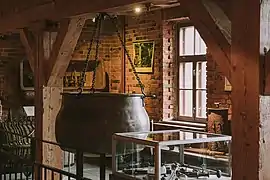 A. Le Coq's beer museum
A. Le Coq's beer museum Põhjala Brewery & Tap Room
Põhjala Brewery & Tap Room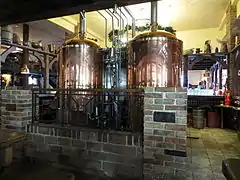 "Beer House" brewpub
"Beer House" brewpub
References
- All About Beer. BALTIC PORTERS.
- Beerguide.ee. VIRU ÕLU. (in Estonian)
- Michael Jackson's Beer Hunter. Estonia free to revive its own brewing culture.
- ERR News. Roughly one third of all alcohol consumed in Estonia bought in Latvia.
- Postimees News. The duelling beer biggies.
- Saku Õlletehas.
- A. Le Coq. About Us.
- Visit Estonia. Saku Brewhouse and Museum of Beer.
- Visit Estonia. A. Le Coq Beer Museum.
- Eesti Õlletootjate Liit. (in Estonian)
- ERR News. Beer producers: July beer sales more than doubled on northern border.
- Larsblog. Brewing koduõlu on Hiiumaa.
- Beer Advocate. Baltic Brewing: In Estonia, a Farmhouse Tradition Survives.
- Pihtla õlu. Traditional Saaremaa beer.
- "Locally produced craft beer trend out of the bottle". ERR. August 6, 2014.
- "Tallinn Calling". www.beer52.com.
- Eesti Väikepruulijate Liit. Liidust. (in Estonian)]
